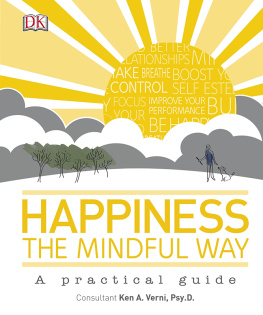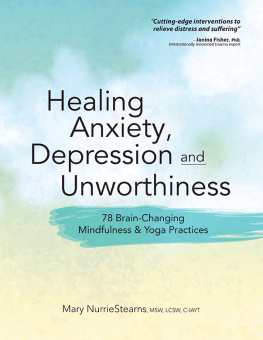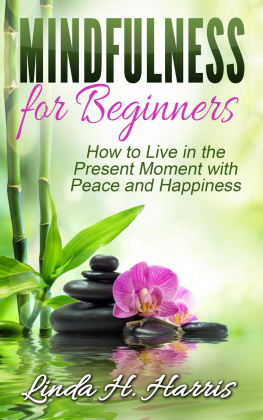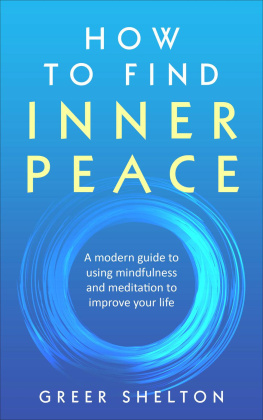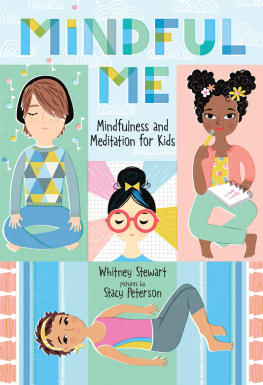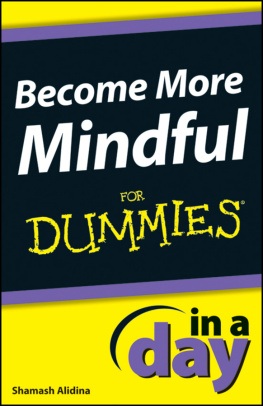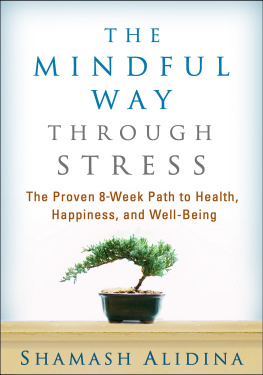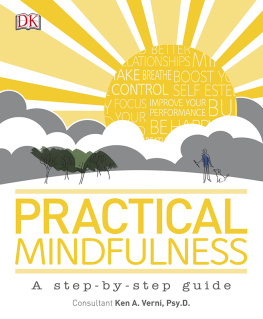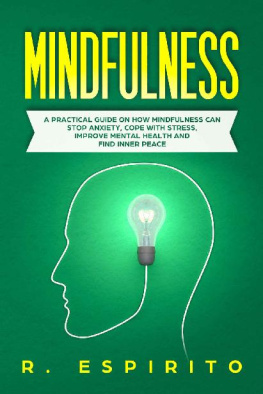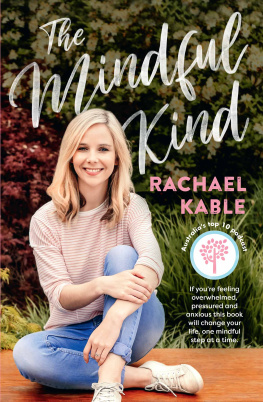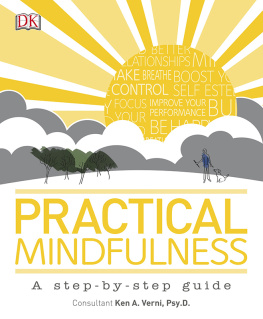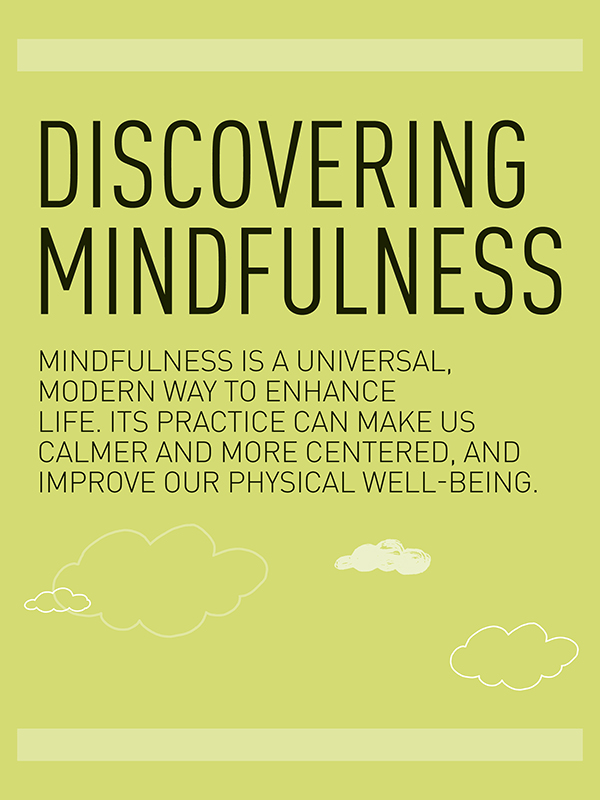Contents
Guide

foreword
M indfulness can be described in many ways. It is a practice of purposefully paying attention in the present moment and bringing a nonjudgemental, compassionate awareness to the nature of things. It is a way of being, a way of relating to our inner and outer experiences, and a coming to our senses, literally and figuratively. At the same time, it is nothing at all, nothing but a rediscovery or a remembering of our natural, inborn capacity to be fully awake in our lives, in contact with things in a direct way without the filters of concepts, past experiences, or likes and dislikes.
This way of seeing is immediately available to all of us at any moment. Try it now if you like. After reading this paragraph, let your eyes move away from the page and let your gaze land on something nearby. Offer it bare attention, seeing it as if for the first time, leaving labels and associations aside. Softly notice its shape, color, texture, and the space it occupies. Practicing further, you might also notice thoughts crossing your mind, your attention wandering to something else, or feelings arising in response to your sensory contact with the object. Simply come home again and again to a direct experience of the object you have chosen. Give it a try now, then return and reread the instructions above before trying again. You can use the same object or a different one each time.
What you just engaged in was a mindfulness practice. You picked an object of attention to help anchor your awareness in present moment experience and you observed what happened in your mind, body, and heart. Most likely, much of what you observed reflects some of the elements of your everyday experience, such as distraction, desire, aversion, restlessness, doubt, or boredom. Yet there may have also been moments of just seeing. This is what is meant by mindfulness practice. It is called a practice because when we do it in a consistent fashion, we get multiple opportunities to practice with the stuff of life. Over time we can gently shift our relationship to this stuff and learn in a safe, gradual, self-paced way how to respondinstead of reactto the habits and frequent flyers of the mind. We learn to cultivate choice and develop a greater sense of efficacy and balance in our lives.
In this way, we gradually restore a healthy, friendly relationship with ourselves, begin to feel less alienated and isolated (from ourselves and others), and reconnect to our own deep intuitive wisdom and creativity. This practice is an inner journey, and perhaps the most important journey of our livesa thought elegantly captured by the American monk and writer Thomas Merton: Of what use is it that we can travel to the Moon, if we cant cross the abyss that separates us from ourselves?.
This book can serve as a thoughtful guide and introduction to the journey of cultivating greater mindful awareness in your life. In clear language, it describes the essence and the practice of mindfulness and suggests action plans for building it into your life. But like any journey, it is important that you follow your own wisdom as well and pay particular attention to what feels helpful and what does not.
It is also important to attend to the way that the judging nature of the mind can subtly turn your mindfulness practice into just one more self-improvement project. Mindfulness offers much more: it is a way of simply coming to know yourself and things just as they are, moment by moment, and opening to the wisdom that naturally arises when one cultivates a compassionate curiosity toward the human experience.
One final description of mindfulness may be useful here. Above all, it is a path of the hearta practice of loving awarenessthat offers to hold any and all experience in a compassionate, spacious embrace. So let the heart guide you through the practices and reflections offered in this book and in each of your moments. Beginning here now.
Ken A. Verni
A beginners guide to the here and now
How mindfulness can enrich your life
The mindful way to well-being is life-changing. If you choose it, youll need to follow a routine of short mindfulness meditations. Alongside that, youll need to become aware of any ingrained habits of mind that have stopped you, so far, from living life to the full.
T he idea of mindfulness is very simple: you pay close attention to an experience in the present moment, while allowing yourself to be open-hearted and spacious. This last word needs a little explanation. Our pure state of mind is spacious, but over time, as we accumulate life experiences, certain habits of thinking form and solidify. Mindfulness meditation, practiced over a period of at least a few weeks, can break down these inner structures and return us to our original openness. Thats why mindfulness practice has been proven effective as an antidote to all kinds of negative mindsets, including poor self-esteem, high anxiety, low levels of vitality and engagement, and mild to moderate depression.
Mindfulness changes your sense of who you are in relation to your own life and to other people. It also gives you better access to your full potential, particularly in terms of relationships and personal goals. To live more mindfully is to live more richly, with more skill, ease, and flexibility. You gain in self-understanding, and can use that as the foundation-stone for a happier life. When challenges occur or you encounter threats in life, youll be less likely to find them overwhelming; and when opportunities arise, youll be able to recognize them and welcome them joyfully into your life. Habits of mind will remain but exert less of a tug, giving you freedom to cultivate healthier ways of thinking.
Introducing the present
The main ingredient in the mindfulness recipe is the present moment. It isnt that you need to concentrate on the moment itself, since a moment is impossible to pin down. Instead, what you do is focus on your experience in the present, forgetting about past and future, or time itself passingas well as about any thoughts or emotions that enter your mind. You might be focusing on something youre doing, or looking at, or listening to, or feeling as a sensation, such as your breath: youre being mindful if you concentrate on this with relaxed but purposeful attention. Formal mindfulness practices, including the ones in this book, take the body, the acts of breathing or walking, or objects as favored points of focus.
truths and myths about mindfulness
Mindfulness is a modern practice that involves paying full attention to your experiences, both good and badit's not a state of mystical bliss or spiritual transcendence. It has no religious dimension.
Mindfulness is
- Recognizing feelings without becoming caught up in them
- Identifying yourself as who you truly areand not identifying yourself with your feelings or mistakes
- Living more in the moment and less in the past and future
- A way to cultivate happiness thats suitable for all.
Mindfulness is not
- Emptying the mind or stopping thinking
- A relaxation technique, though it will make you more relaxed as a by-product
- An escape from personalityit reveals to us our personality
- A charter for living life without planningyou can plan in a mindful way, just as you can learn mindfully from the past.

